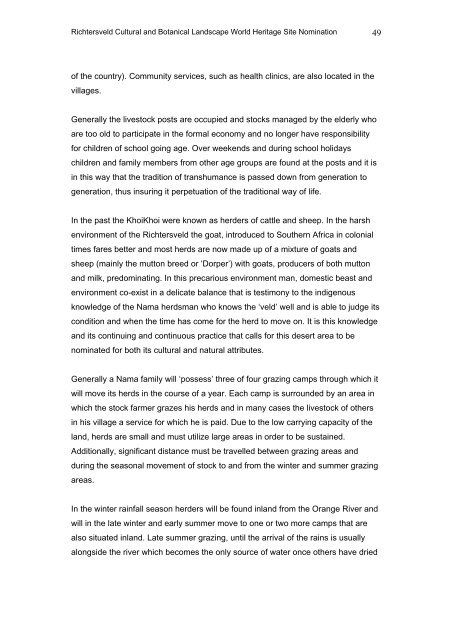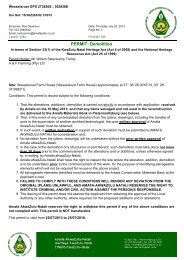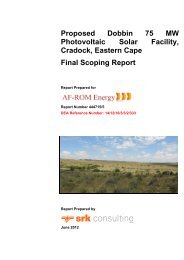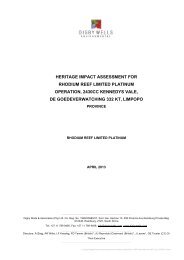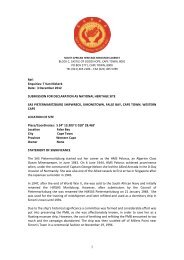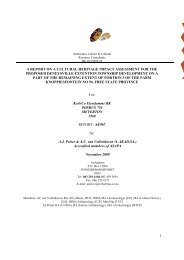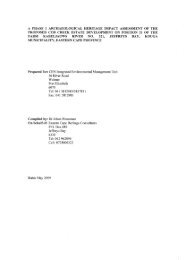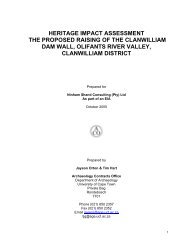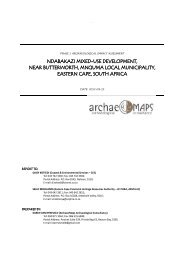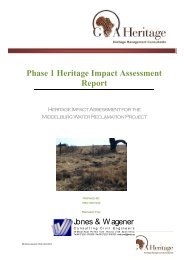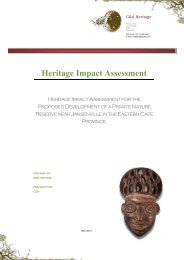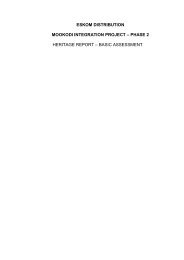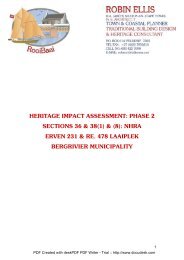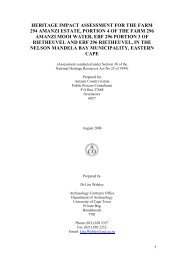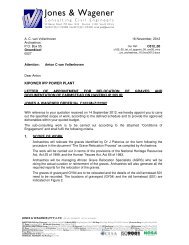the richtersveld cultural and botanical landscape - SAHRA
the richtersveld cultural and botanical landscape - SAHRA
the richtersveld cultural and botanical landscape - SAHRA
Create successful ePaper yourself
Turn your PDF publications into a flip-book with our unique Google optimized e-Paper software.
Richtersveld Cultural <strong>and</strong> Botanical L<strong>and</strong>scape World Heritage Site Nomination 49<br />
of <strong>the</strong> country). Community services, such as health clinics, are also located in <strong>the</strong><br />
villages.<br />
Generally <strong>the</strong> livestock posts are occupied <strong>and</strong> stocks managed by <strong>the</strong> elderly who<br />
are too old to participate in <strong>the</strong> formal economy <strong>and</strong> no longer have responsibility<br />
for children of school going age. Over weekends <strong>and</strong> during school holidays<br />
children <strong>and</strong> family members from o<strong>the</strong>r age groups are found at <strong>the</strong> posts <strong>and</strong> it is<br />
in this way that <strong>the</strong> tradition of transhumance is passed down from generation to<br />
generation, thus insuring it perpetuation of <strong>the</strong> traditional way of life.<br />
In <strong>the</strong> past <strong>the</strong> KhoiKhoi were known as herders of cattle <strong>and</strong> sheep. In <strong>the</strong> harsh<br />
environment of <strong>the</strong> Richtersveld <strong>the</strong> goat, introduced to Sou<strong>the</strong>rn Africa in colonial<br />
times fares better <strong>and</strong> most herds are now made up of a mixture of goats <strong>and</strong><br />
sheep (mainly <strong>the</strong> mutton breed or ‘Dorper’) with goats, producers of both mutton<br />
<strong>and</strong> milk, predominating. In this precarious environment man, domestic beast <strong>and</strong><br />
environment co-exist in a delicate balance that is testimony to <strong>the</strong> indigenous<br />
knowledge of <strong>the</strong> Nama herdsman who knows <strong>the</strong> ‘veld’ well <strong>and</strong> is able to judge its<br />
condition <strong>and</strong> when <strong>the</strong> time has come for <strong>the</strong> herd to move on. It is this knowledge<br />
<strong>and</strong> its continuing <strong>and</strong> continuous practice that calls for this desert area to be<br />
nominated for both its <strong>cultural</strong> <strong>and</strong> natural attributes.<br />
Generally a Nama family will ‘possess’ three of four grazing camps through which it<br />
will move its herds in <strong>the</strong> course of a year. Each camp is surrounded by an area in<br />
which <strong>the</strong> stock farmer grazes his herds <strong>and</strong> in many cases <strong>the</strong> livestock of o<strong>the</strong>rs<br />
in his village a service for which he is paid. Due to <strong>the</strong> low carrying capacity of <strong>the</strong><br />
l<strong>and</strong>, herds are small <strong>and</strong> must utilize large areas in order to be sustained.<br />
Additionally, significant distance must be travelled between grazing areas <strong>and</strong><br />
during <strong>the</strong> seasonal movement of stock to <strong>and</strong> from <strong>the</strong> winter <strong>and</strong> summer grazing<br />
areas.<br />
In <strong>the</strong> winter rainfall season herders will be found inl<strong>and</strong> from <strong>the</strong> Orange River <strong>and</strong><br />
will in <strong>the</strong> late winter <strong>and</strong> early summer move to one or two more camps that are<br />
also situated inl<strong>and</strong>. Late summer grazing, until <strong>the</strong> arrival of <strong>the</strong> rains is usually<br />
alongside <strong>the</strong> river which becomes <strong>the</strong> only source of water once o<strong>the</strong>rs have dried


